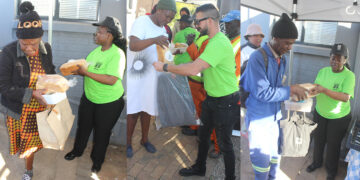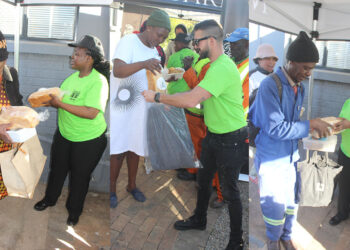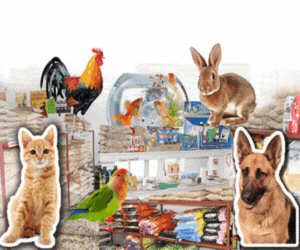A new report on Cape Town’s food system reveals deep-rooted inequalities — structural, infrastructural and historical — that influence urban food access and nutrition. It examines how the city’s social and physical landscape shapes residents’ interaction with food, influenced by its history, infrastructure and past policies.
The report, part of a series covering fifteen1 African cities including Cape Town (South Africa), Tamale (Ghana) and Dakar (Senegal) amongst others, highlights that infrastructure significantly influences food access, quality, health outcomes and the food economy, more so than the type of food available alone. The reports will come under panel discussion on Wednesday 24 July at Food Indaba 2024
The quality of housing, stability of energy, accessibility of water and transportation are crucial factors in the food system, impacting nutrition and health outcomes more than typically acknowledged in media and academic circles, say the lead authors.
“The pace and scale of urban growth in Africa are unprecedented. Africa is predominantly urban, not rural as many think. To ensure thriving cities, we must focus on nourishing them well. These reports aim to address the essential aspects of this urban transition,” says Gareth Haysom, who will be leading the panel discussion on the State Of The City Food System Report, which will be live streamed, free for anyone to attend, from Cape Town TV Studios. The panel will analyse the Cape Town report to uncover the reasons behind the failure of current approaches.
Haysom, an urban food systems researcher at the African Centre for Cities (ACC) at the University of Cape Town, co-leads the Urban Food Systems Research Cluster with Jane Battersby. With 25 years of experience, his work explores how food systems intersect with urbanization in African cities, using food as a lens to study cities across the global South.
“The report doesn’t shy away from exposing the inequities within Cape Town’s food system and while solutions aren’t provided, highlighting these issues paves the way for future discussion and are a springboard for ongoing dialogue.” The city food systems reports mark the initial phase of this initiative, with plans to expand on these insights at the Food Indaba in the coming years.

Harnessing Hunger For Power
In its sixth hosting year, Food Indaba, which started in 2014, continues to explore our intricate food systems through unconventional and educational approaches. It is an annual programme of talks and events that focus on the local food system with the goal of fostering a healthier, more resilient and just food system.
Many events are open free to the public. Another informative, free event for all to attend is 90-minute Zoom webinar, on Tuesday 23 July, spotlighting the dynamics of Power and Hunger in key African cities in countries including Kenya, Tunisia, Uganda, South Africa and Burkina Faso. Panelists will discuss both overt and covert tactics, examining hunger’s use as a weapon in armed conflicts and its normalization as a tool for marginalizing ethnic minorities and the underprivileged.
Moderated by Paul Currie, ICLEI Africa, the webinar aims to highlight key forms of resistance to the weaponization of hunger, offering valuable insights. Streamed online from Cape Town TV Studios, this session will feed into the Power and Hunger CONFERENCE – a full day event on Thursday 1 August, at Makers Landing at the V&A Waterfront.
The morning session – A Critical Examination of Food as a Weapon – is dedicated to identifying and demonstrating the ways in which hunger is used as an expression of power across the planet. This critical forum delves into the harsh realities faced by a multitude of regions across the globe, from Gaza to Sudan to Ukraine to South Africa and the Philippines. The afternoon session takes a solution-oriented approach renowned Hasso Plattner d-School Afrika leading a dynamic workshop on Design Thinking for Food Systems – Building Resilience.
“Attending Food Indaba is crucial because it connects African cities in understanding urban food systems. It builds collaboration among researchers, fostering a network for sharing knowledge and shaping future projects,” says Kurt Ackermann, chief executive and a trustee of the SA Urban Food & Farming Trust. “As Africa urbanizes rapidly, grasping city food systems is key to creating healthy urban environments. It challenges traditional views on food security, urging nuanced approaches that fit African cities’ unique contexts. With Africa’s urban transformation underway, Food Indaba prompts action among policymakers and planners to prioritize urban food systems that sustain and nourish communities.”
Mark Your Calendars
Nineteen events are scheduled for this year’s Food Indaba 2024, which takes place from Monday 22 July to Sunday 4 August at venues across Cape Town including the V&A Waterfront precinct, Mowbray, Langa, Philippi, Lynedoch and Stellenbosch. Events include talks, workshops, dining and drinks experiences, guided tours and family activities, all aimed at deepening our understanding of food in today’s world.
Food Indaba is hosted by the SA Urban Food & Farming Trust with co-host and sponsor SOLVE@Waterfront. Co-sponsored by the DSI-NRF Centre of Excellence in Food Security and AfriFOODlinks (Funded by the European Union). Event partners include the African Centre for Cities, The UNESCO Chair in Science and Education for African Food Systems, ICLEI Africa, Hasso Plattner d-School Afrika, Bertha House, Philippi Village, Oranjezicht City Farm, City of Cape Town, 16 on Lerotholi, Cape Town TV and Derrick Integrated Communications.
For more information
Website: foodindaba.org
Follow the event on social media with #FooddialogueSA and on the following channels:
Facebook: fb.me/FoodDialogues
Instagram: @food_dialogues
Twitter: @food_dialogues
LinkedIn: LinkedIn.com/showcase/food-dialogues
Soweto Sunrise News

































